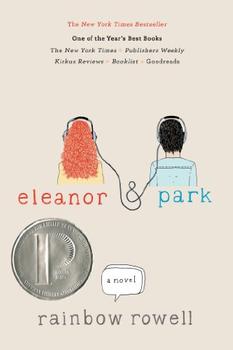Summary | Excerpt | Reviews | Beyond the book | Read-Alikes | Genres & Themes | Author Bio

Sixteen-year-old Lucy Beck-Moreau is a has-been; or so she, her mother and grandfather believe. Once a famous child-prodigy concert pianist with a promising career ahead of her, she threw it all away by walking off stage at an important international competition in Prague after her grandmother's death left her feeling betrayed. Not wanting it to interfere with her performance, her family had kept the severity of her beloved grandmother's condition from Lucy. Now she won't touch the piano and the family shifts the intense focus to her talented ten-year-old brother, Gus.
But without the music that once consumed her every waking moment, Lucy doesn't know who she is or what makes her happy. She misses her grandmother, who always knew the right thing to say and was Lucy's quiet refuge from her tyrannical, patriarchal grandfather. And she misses playing, although she refuses to let on; she won't give her grandfather the satisfaction, whose philosophy is "why play, why do anything if you aren't destined for greatness?" Lucy worries about her "mannered and adult" little brother, who she thinks is missing out on childhood the same way she had, for, "…in their house, childhood, like grief, was an episode merely tolerated. An inconvenience and an obstacle to the real work of life: proving to the world and to yourself that you weren't just taking up space."
The story opens with Gus's ancient piano teacher keeling over and dropping dead during a lesson, with only Gus and Lucy present. Lucy tries to resurrect Madame Temnikova in vain—yet another failure. It's a traumatic event for Lucy and Gus, but for their mom and grandfather, Madame Temnikova's death is an irritation and inconvenience—they need to find Gus a new teacher right away to keep him on track for the upcoming showcase and competition.
Enter Will, Gus's new piano teacher. Young, hip and kind, he takes a fresh approach to coaching and a personal interest in getting Lucy back to the keys, despite her determination not to play again. She has never played for fun, just for herself—the very idea is foreign to her. But she does know, if she were to ever play again, it would have to be on her own terms. When Lucy tells Will she's confused—he says "you'll get used to it. Adulthood is a perpetual state of confusion."
The story is set in San Francisco, and Lucy, beautiful and poised, leads the privileged life of attending a prestigious private school, having expensive clothes and a private chef, yet she is filled with self-doubt. Sarah Zarr precisely paints Lucy's emotional landscape; we see her as both a vulnerable child and a teen too old for her years—a girl struggling to find her place in the world with a family who insists on perfection. In order for Lucy to move forward, she has to learn how to stand up to her overbearing grandfather and to start making her own decisions about her life, despite huge resistance from her family. She has to realize that doing the right thing for herself might sometimes mean hurting others.
The title, The Lucy Variations, says much about the story. Musical variations refer to a technique where certain features of a tune, a piece, are altered while others remain the same. In a similar manner, Lucy must find a way to change her expectations and her relationship to music and to her family, while remaining true to herself.
Although the novel is serious, it is not without humor; it's full of snappy dialogue that keeps the pace moving at a good clip. For instance, when Lucy complains about her mother to her friend Reyna, whose parents are going through a messy divorce, Reyna says, "Well, it's better than living with a cheater and embezzler." Lucy responds with, "At least your dad smiles more than once a week." Reyna's comeback is, "He's an orthodontist…That's not a smile. That's advertising."
Lucy has some murky issues with a couple of older men outside of her family who she looks up to and wants to please. One particularly flirtatious relationship barely stops short of inappropriate but is never really properly addressed as such. As a mother with daughters, I was uncomfortable with a married adult male flirting with a teenage girl and not getting his comeuppance for it.
But in the end, The Lucy Variations is a life-affirming novel that uses one girl's unusual journey to speak to the bigger question of "Who am I?" I think teens will enjoy the glimpse into Lucy's unique world, and will relate on a number of levels — tired of being told what to do with their lives and making harsh choices because it's the only way they can feel in control. Standing up to the authoritarian grown-ups in their lives and meeting resistance when they start to make their own decisions. In other words, the universal process of growing up.
I would recommend The Lucy Variations to teen girls and adults who enjoy YA and are interested in a glimpse into a sympathetic teen's life and the privileged world of musical prodigies.
![]() This review was originally published in The BookBrowse Review in June 2013, and has been updated for the
June 2014 edition.
Click here to go to this issue.
This review was originally published in The BookBrowse Review in June 2013, and has been updated for the
June 2014 edition.
Click here to go to this issue.

If you liked The Lucy Variations, try these:

by Rainbow Rowell
Published 2020
Set over the course of one school year in 1986, this is the story of two star-crossed misfits - smart enough to know that first love almost never lasts, but brave and desperate enough to try. When Eleanor meets Park, you'll remember your own first love - and just how hard it pulled you under.

by Taylor Jenkins Reid
Published 2020
A New York Times bestseller. A gripping novel about the whirlwind rise of an iconic 1970s rock group and their beautiful lead singer, revealing the mystery behind their infamous breakup.
Your guide toexceptional books
BookBrowse seeks out and recommends the best in contemporary fiction and nonfiction—books that not only engage and entertain but also deepen our understanding of ourselves and the world around us.